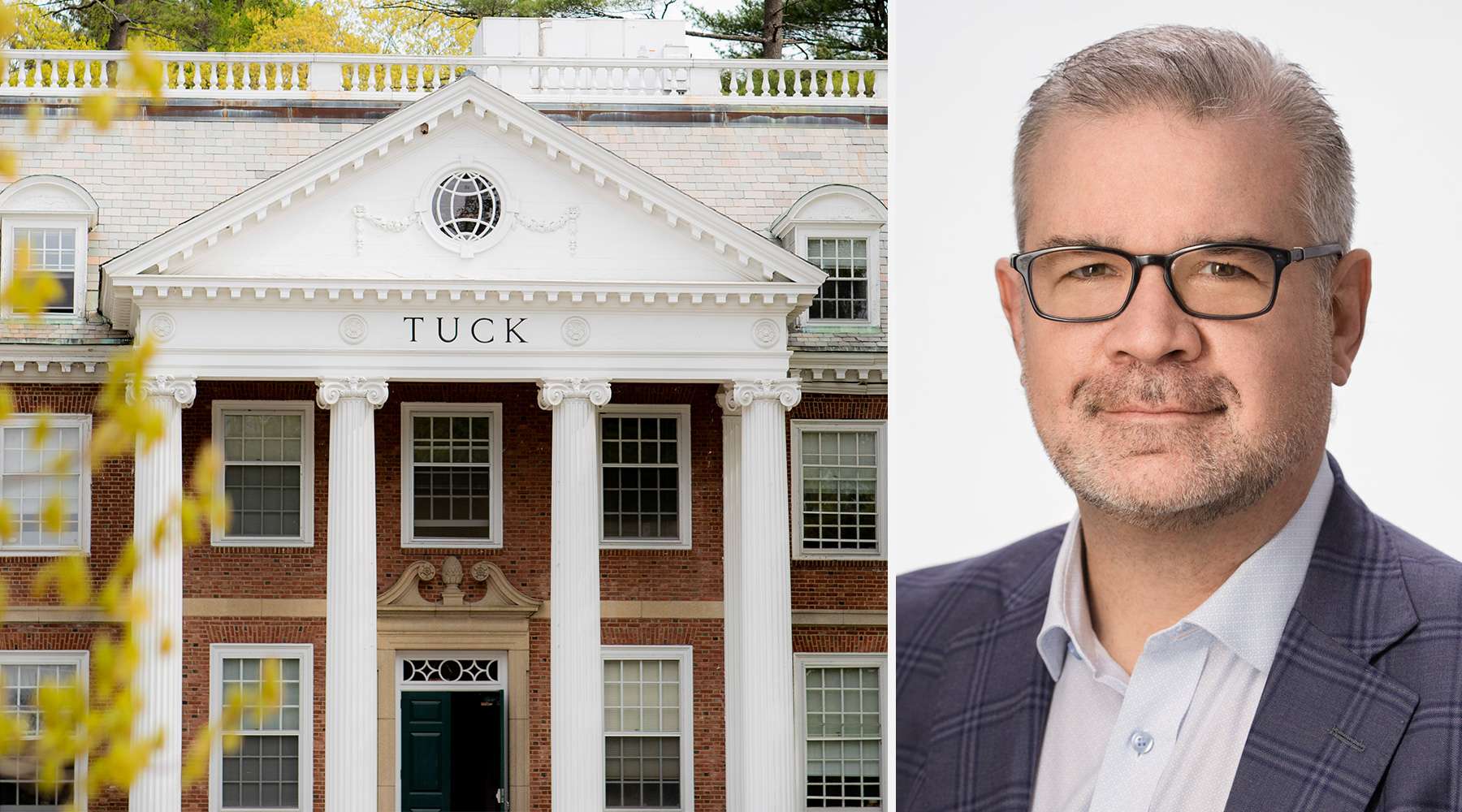
Learning how to engage in rigorous and respectful dialogue was a hallmark of Ken Allen’s experience at Dartmouth, and later Tuck. As civil discourse has become increasingly polarized elsewhere, Allen D’97, TH’98, T’05 founded Thinkifi with the goal of building better digital tools to support online discussion.
We asked Allen to reflect on his 27-year business career, the successes and challenges he has faced as an entrepreneur, and the power of the Tuck network:
What have you been up to since graduating from Tuck?
Prior to starting my current company, Thinkifi, I spent the majority of my post-Tuck career in the Technology Investment Banking industry. After graduating from Tuck in 2005, I became an Associate in Deutsche Bank’s Technology Investment Banking group, based in Boston. In 2007, I moved over to Blackstone, in the firm’s M&A Advisory group, where I stayed for over a decade and ran the firm’s Technology Services practice. Blackstone spun out the group in 2015 and re-branded the firm PJT Partners, where I spent three years. In 2018, I decided to embark out on my own and founded a strategic advisory firm called Seaport Capital Partners. In 2022, I moved back into the corporate world and joined KPMG in the firm's investment banking practice, where I led the firm’s Technology Services group for North America.
What inspired your idea for Thinkifi?
I came up with the concept for Thinkifi in 2011. At the time, I was very frustrated with the lack of tools on the internet devoted to fostering rigorous, thoughtful, respectful, intellectual, and civil discourse. This was the type of discourse I experienced in my academic and professional career, whether at Dartmouth, Tuck, Blackstone, and other places. I became interested in creating an online platform that could replicate the experiences I had in the classroom and boardroom.
Unfortunately, the problem of a lack of such a space has only gotten worse over the past decade, with our online discussions too often filled with outrage, vitriol, misinformation, and hate. The current political environment seems only to have made the situation worse. People who disagree are not listening to each other and seeking compromise, a fundamental aspect of democracy. Last year, I had had enough and decided to try to solve the problem with Thinkifi.
What are some of the biggest challenges entrepreneurs face in turning an idea into a viable product?
The biggest challenges I have faced so far are related to securing clients and capital. Before you have a product, it is very difficult to attract either. You end up selling a vision, but without at least a working prototype to show people what that vision is, it is difficult to get buy-in. This can be discouraging, even depressing. Managing one’s emotions in the face of such difficulty can be hard. Entrepreneurship has the highest highs and the lowest lows. During those low periods, it is crucial to stay positive and committed to your vision.
What advice do you have for Tuck students interested in launching their own venture?
It is critical to secure a top-notch team. That goes without saying. The team could be in the form of a co-founder/co-founders, an advisory board, or outsourced/fractional resources. The team members should have complementary skill sets and be willing and able to push the founder out of his or her comfort zone and to share opinions that might not be popular. I believe it is also important to develop the product with real-time feedback from the client/customer. In our case, we are creating a product for professors and students and, as such, have assembled an internal team of these people who are actively opining on product direction and features. If you fail to get feedback in real-time, you develop the product in a vacuum, which risks the development of features that are not desired by users. Lastly, lean heavily on your network. People want to help you achieve your vision; tapping that knowledge and expertise is critical.
What role has the Tuck network played in your life and career?
The Tuck network has made a huge difference in my career. Some of my best friends are members of the class of 2005—their advice has been instrumental in each phase of my career. Most recently, I have leaned on the Tuck network heavily as thought partners in formulating my vision for Thinkifi. We will also be raising a round of friends and family capital in the coming months and Tuckies will definitely be on the list for that opportunity.
Ken Allen’s 27-year career spans entrepreneurship, investment banking and strategic consulting. Before founding Thinkifi, Ken was an investment banker with KPMG’s Corporate Finance group, where he led the firm’s Technology Services vertical. Prior to KPMG, Ken provided strategic consulting and investment banking services through a firm he founded, Seaport Capital Partners. Earlier in Ken’s career, he was a Managing Director at PJT Partners and Blackstone in these firms’ Strategic Advisory practices, where he focused on Mergers & Acquisitions for some of the largest technology companies in the world. Prior to Blackstone, Ken worked at Deutsche Bank, where he focused on advising technology clients on a wide range of transactions, from equity and debt offerings to M&A. During his investment banking career, Ken advised technology clients on over $40 billion of transacted value across 40 transactions.
Prior to Ken’s investment banking career, he was an entrepreneur at Xilicon, a firm he founded in 1999, that provided an app store for downloadable digital content such as software, videos, and eBooks. Ken launched his career in the strategic consulting industry, working at both Bain & Company and The Parthenon Group (now EY Parthenon).
He received his MBA from the Tuck School of Business at Dartmouth, where he was a Tuck Scholar, and his B.E. (Electrical Engineering) and A.B. (Engineering Sciences) from Dartmouth College, where he was a member of Phi Beta Kappa and from which he graduated with Summa Cum Laude honors.